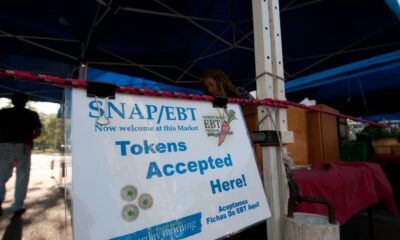Business
Arizona Legislators Strike Back Against Bitcoin Scams with New Crypto Kiosk Rules

A new bill in Arizona aimed at combating cryptocurrency scams has advanced toward potential enactment. House Bill 2387, introduced by Rep. David Marshall, seeks to regulate “crypto kiosks,” which have become focal points for scams targeting consumers.
The prevalence of cryptocurrency scams has surged, prompting Attorney General Kris Mayes to express support for initiatives aimed at addressing these issues. Scammers exploit crypto kiosks—located in businesses and malls—to trick individuals into depositing cash under false pretenses, often posing as loved ones or government officials.
Last year, the Yavapai County Sheriff’s Office (YCSO) collaborated with the Attorney General’s Office to alert local business owners about these scams. They recommended warnings on kiosks that resemble those typically affixed to gift cards, as gift card-related scams have also been widespread.
During a recent Senate Committee on Judiciary and Elections meeting, Rep. Marshall noted that victims have traveled long distances to use these kiosks, only to find their money vanished by the time they returned home. He emphasized the importance of consumer caution, drawing from his own experiences in cryptocurrency.
Statistics from 2023 reveal staggering losses, with Americans reporting $5.6 billion in fraud linked to cryptocurrency. Elderly individuals constitute a significant portion of these victims, a trend echoed by stakeholders advocating for the bill.
Brendon Blake, from AARP, highlighted that Arizona ranks sixth nationally in fraud-related losses. Peoria Police Deputy Chief Douglas Steele added that an estimated 40% of scam incidents go unreported.
The proposed legislation mandates that kiosk operators provide consumer warnings prior to transactions and offer educational resources on detecting fraud. Additionally, kiosks will need to issue physical receipts detailing necessary information for law enforcement in potential fraud cases.
Another key provision limits the amount of money new accounts may deposit or transfer within a 72-hour period, addressing the common tactic of repeated transactions to swindle victims. The measure also allows authorities to request blockchain analytics from kiosk operators, who must maintain compliance with federal anti-money laundering standards.
The Attorney General’s Office indicated its collaboration with Marshall on this bill and is advocating for federal measures to enhance fraud prevention across states.
Amidst rising concerns about cryptocurrency theft, including significant breaches conducted by hackers, scams utilizing artificial intelligence have also emerged. Reports reveal that scammers have used deep fakes to impersonate trusted voices in order to coax victims into performing transactions at these kiosks.
Richie Taylor, a spokesperson for the Attorney General, stressed the need for public education on fraud prevention across all age groups. He suggested establishing safety protocols, such as secret phrases among family members, to mitigate the risk of falling victim to emotional manipulations from scammers.
Lawmakers are contemplating whether additional measures should be implemented, including a complete ban of these kiosks in the state. Marshall expressed openness to exploring more stringent regulations, while Taylor underscored the necessity of federal action.
Sen. Analise Ortiz, who supported the bill, acknowledged its importance but hoped for broader protections against these “atrocious” scams.
With unanimous approval from the committee, the bill awaits consideration by the full Senate. Should it pass, it will return to the House of Representatives for a final vote before being presented to Governor Katie Hobbs for her signature.

















